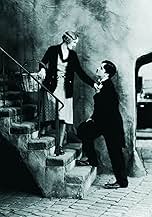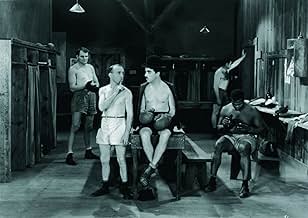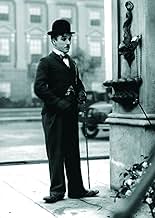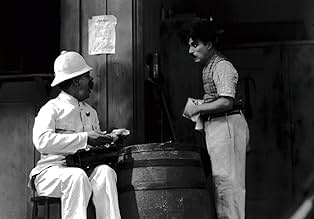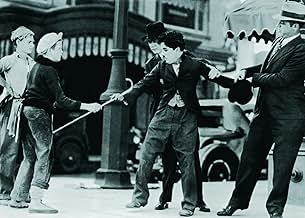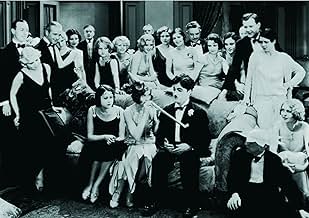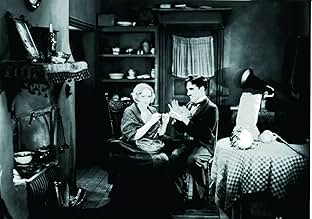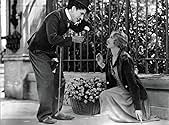With the aid of a wealthy erratic tippler, a dewy-eyed tramp who has fallen in love with a sightless flower girl accumulates money to be able to help her medically.With the aid of a wealthy erratic tippler, a dewy-eyed tramp who has fallen in love with a sightless flower girl accumulates money to be able to help her medically.With the aid of a wealthy erratic tippler, a dewy-eyed tramp who has fallen in love with a sightless flower girl accumulates money to be able to help her medically.
- Director
- Writers
- Stars
- Awards
- 6 wins total
Charles Chaplin
- A Tramp
- (as Charlie Chaplin)
Al Ernest Garcia
- The Millionaire's Butler
- (as Allan Garcia)
Johnny Aber
- Newsboy
- (uncredited)
Jack Alexander
- Boxing Match Spectator
- (uncredited)
T.S. Alexander
- Doctor
- (uncredited)
Victor Alexander
- Superstitious Boxer
- (uncredited)
Albert Austin
- Street Sweeper
- (uncredited)
- …
Harry Ayers
- Cop
- (uncredited)
Eddie Baker
- Boxing Fight Referee
- (uncredited)
Henry Bergman
- Mayor
- (uncredited)
- …
Edward Biby
- Nightclub Patron
- (uncredited)
Buster Brodie
- Bald Party Guest
- (uncredited)
Jeanne Carpenter
- Diner in Restaurant
- (uncredited)
- Director
- Writers
- All cast & crew
- Production, box office & more at IMDbPro
Summary
Reviewers say 'City Lights' is celebrated for its blend of comedy and pathos, showcasing Charlie Chaplin's iconic Tramp character in a poignant love story with a blind flower girl. The film is praised for its masterful physical comedy, expressive acting, and memorable scenes, particularly the boxing match and the emotional finale. Chaplin's direction, composition of the score, and the film's historical significance are frequently highlighted. However, some reviewers note that the silent format and slow pacing may challenge modern audiences. The themes of love, selflessness, and social commentary resonate deeply, making 'City Lights' a timeless classic.
Featured reviews
Once again Chaplin plays his famous creation, the beloved Tramp
The noble Little Fellow meets and falls in love with a blind flower girl
She assumes he is wealthy man and offers him a flower, which he attentively accepts with his last penny
One night by chance he rescues a drunken millionaire from drowning The rich gentleman becomes a generous friend when drunk but doesn't recognize the tramp when sober Chaplin takes the blind girl under his wing, and takes flight with the millionaire's money to cure her blindness
"City Lights" engaged a true genius in a graceful and touching performance which arouses profound feelings and joy with great simplicity of style and tragic tale Each scene was the result of hard-working detail and planning
One night by chance he rescues a drunken millionaire from drowning The rich gentleman becomes a generous friend when drunk but doesn't recognize the tramp when sober Chaplin takes the blind girl under his wing, and takes flight with the millionaire's money to cure her blindness
"City Lights" engaged a true genius in a graceful and touching performance which arouses profound feelings and joy with great simplicity of style and tragic tale Each scene was the result of hard-working detail and planning
Film has become a medium that is strongly influenced by nostalgia. Old films have become journeys to the past; ways to visit times and people that no longer are. Since film is an art that is based on the innovation of previous works, it has an element of nostalgia in its foundation. We look on the old to find what elements should make up the new. In City Lights, and other silent works of film, a passion emerges that is uniquely honest and sincere. While watching the film, I was impressed that Chaplin really did love the story, the sets, the crew; the whole project. While this may not have been the complete reality, it felt that way, and thus made the film more enjoyable. In silent films the audience is forced to be completely reliable on the visual elements of the film; there are no elaborate sound effects or dialogue to provoke an emotional response.
Since film is at its very core a visual medium, I find silent films to be the basic form of the medium. I don't use the word basic here in a demeaning sense, but I compare the beauty of silent films to the beauty of early European art, before the concept of perspective was developed in the Renaissance. Many books and tomes featured people as tall as the castles they stood in; these works of art were not technologically advanced, but they were, and are, beautiful. The same example is found when comparing early darreographs of wild animals to contemporary photographs found in National Geographic. There is a warmth found in City Lights, and other Chaplin films (The Kid, Modern Times) that would be lost in the sea of cinematic technology that floods films today. Maybe it's just that with simplicity comes honesty, and honesty is perhaps the most powerful emotion that can cross through the screen and be felt by the viewer.
Since film is at its very core a visual medium, I find silent films to be the basic form of the medium. I don't use the word basic here in a demeaning sense, but I compare the beauty of silent films to the beauty of early European art, before the concept of perspective was developed in the Renaissance. Many books and tomes featured people as tall as the castles they stood in; these works of art were not technologically advanced, but they were, and are, beautiful. The same example is found when comparing early darreographs of wild animals to contemporary photographs found in National Geographic. There is a warmth found in City Lights, and other Chaplin films (The Kid, Modern Times) that would be lost in the sea of cinematic technology that floods films today. Maybe it's just that with simplicity comes honesty, and honesty is perhaps the most powerful emotion that can cross through the screen and be felt by the viewer.
If there is one Charlie Chaplin film to recommend, as others have pointed to in the past, City Lights is the one. Though Chaplin played his Tramp character superbly in other movies, like Modern Times and The Gold Rush, City Lights displays the Tramp at his funniest, his bravest, his most romantic, and his most sympathetic. It's tough for filmmakers in recent days to bring the audience so close emotionally with the characters, but it's pulled off.
The film centers on three characters- the Tramp, the quintessential, funny homeless man who blends into the crowd, but gets caught in predicaments. He helps a drunken businessman (Myers, a fine performance in his own right) from suicide, and becomes his on and off again friend (that is, when it suits him and doesn't notice his 'friend's' state). The other person in the Tramp's life is the Blind Flower Girl (Virginia Cherrill, one of the most absorbing, beautiful, and key female performances in silent film), who are quite fond of each other despite the lack of total perception. The emotional centerpiece comes in obtaining rent and eye surgery money, which leads to a (how else can I put it) magical boxing match where it's basically a 180 from the brutality and viscerality of a match in say Raging Bull.
Though there is no dialog, the film achieves a timelessness- it's essentially a tale of two loners who find each other, lose each other, and find each other again (the last scene, widely discussed by critics for decades, is moving if not tear-inducing). And it's never, ever boring- once you get along with the Tramp, you find the little things about him, the reaction shots, the little things he does after the usual big gag (look to the ballroom scene for examples of this, or when he gets a bottle of wine poured down his pants without the other guy noticing). Truth be told, if this film makes you indifferent, never watch Chaplin again. But if you give yourself to the film, you may find it's one of the most charming from the era, or perhaps any era.
The film centers on three characters- the Tramp, the quintessential, funny homeless man who blends into the crowd, but gets caught in predicaments. He helps a drunken businessman (Myers, a fine performance in his own right) from suicide, and becomes his on and off again friend (that is, when it suits him and doesn't notice his 'friend's' state). The other person in the Tramp's life is the Blind Flower Girl (Virginia Cherrill, one of the most absorbing, beautiful, and key female performances in silent film), who are quite fond of each other despite the lack of total perception. The emotional centerpiece comes in obtaining rent and eye surgery money, which leads to a (how else can I put it) magical boxing match where it's basically a 180 from the brutality and viscerality of a match in say Raging Bull.
Though there is no dialog, the film achieves a timelessness- it's essentially a tale of two loners who find each other, lose each other, and find each other again (the last scene, widely discussed by critics for decades, is moving if not tear-inducing). And it's never, ever boring- once you get along with the Tramp, you find the little things about him, the reaction shots, the little things he does after the usual big gag (look to the ballroom scene for examples of this, or when he gets a bottle of wine poured down his pants without the other guy noticing). Truth be told, if this film makes you indifferent, never watch Chaplin again. But if you give yourself to the film, you may find it's one of the most charming from the era, or perhaps any era.
Charlie Chaplin's "City Lights" contains a blend of humor and humanity that make it memorable for everyone who watches it. Although made very much in the old-fashioned silent film tradition, much of it is timeless, too.
After a few minutes of slapstick at the beginning, Charlie's "little tramp" character makes two acquaintances. He meets a blind girl selling flowers, who mistakes him for a rich man, and the two become very fond of each other. Then he meets a real millionaire, who is drunk, depressed, and about to commit suicide. In a comic scene, the tramp persuades the millionaire not to go through with it, making himself a devoted friend.
The tramp soon learns that there is an operation that could give the girl her sight, and tries to think of some way he could help. His scenes with the girl and her grandmother are moving, while his determination to help lead him into some comic escapades - his attempt to win money in a boxing match being particularly funny, and one of Chaplin's best comic pieces. Meanwhile, when his millionaire friend is drunk, he dotes on the tramp, but when sober he forgets who the tramp is, leading to more amusing scenes and occasional trouble for Charlie.
All of the comedy leads up to a finale that is one of the best-remembered scenes in any film. "City Lights" shows the power of the camera in the hands of a master, who without words can move his audience or make them laugh. Anyone who appreciates good cinema should see it at least once.
After a few minutes of slapstick at the beginning, Charlie's "little tramp" character makes two acquaintances. He meets a blind girl selling flowers, who mistakes him for a rich man, and the two become very fond of each other. Then he meets a real millionaire, who is drunk, depressed, and about to commit suicide. In a comic scene, the tramp persuades the millionaire not to go through with it, making himself a devoted friend.
The tramp soon learns that there is an operation that could give the girl her sight, and tries to think of some way he could help. His scenes with the girl and her grandmother are moving, while his determination to help lead him into some comic escapades - his attempt to win money in a boxing match being particularly funny, and one of Chaplin's best comic pieces. Meanwhile, when his millionaire friend is drunk, he dotes on the tramp, but when sober he forgets who the tramp is, leading to more amusing scenes and occasional trouble for Charlie.
All of the comedy leads up to a finale that is one of the best-remembered scenes in any film. "City Lights" shows the power of the camera in the hands of a master, who without words can move his audience or make them laugh. Anyone who appreciates good cinema should see it at least once.
Chaplin takes himself a little more seriously in City Lights, and the results are spectacular. The musical score which Chaplin composed for the film was one of the many highlights, and even though Charlie's performance is much more dramatic than usual in some scenes, the hilarious comedy for which he is known and loved is still abundant.
City Lights is so well made that it is one of the very few movies in which the obvious flaws can be gladly overlooked. Yes, you can clearly see the string holding Chaplin up in the sidesplittingly funny boxing scene, but who cares? That is such classic slapstick that little things like that really don't matter. Besides, let's keep in mind that this movie was made seventy years ago.
Chaplin does a phenomenal job in his traditional role of the tramp, and develops a perfectly convincing romantic relationship with the blind flower girl on the sidewalk. His friendship with the drunken rich guy is hilarious, but it also makes a significant comment about the problems of alcohol. This is truly a great film, which should not be forgotten.
City Lights is so well made that it is one of the very few movies in which the obvious flaws can be gladly overlooked. Yes, you can clearly see the string holding Chaplin up in the sidesplittingly funny boxing scene, but who cares? That is such classic slapstick that little things like that really don't matter. Besides, let's keep in mind that this movie was made seventy years ago.
Chaplin does a phenomenal job in his traditional role of the tramp, and develops a perfectly convincing romantic relationship with the blind flower girl on the sidewalk. His friendship with the drunken rich guy is hilarious, but it also makes a significant comment about the problems of alcohol. This is truly a great film, which should not be forgotten.
Did you know
- TriviaChaplin re-shot the scene in which the Little Tramp buys a flower from the blind flower-girl 342 times, as he could not find a satisfactory way of showing that she thought the mute tramp was wealthy.
- Goofs(at around 50 mins) When the man swallows part of the Tramp's soap and starts spraying bubbles, the tube used to spray the bubbles is clearly visible behind him.
- Quotes
The Tramp: You can see now?
A Blind Girl: Yes, I can see now.
- Alternate versionsAbout seven minutes of footage of Georgia Hale playing the flower girl exists and is included in the 2003 DVD release. The footage was shot during a brief period when the actress originally cast to play the character had been fired and replaced with Hale, but Charles Chaplin was forced to resume filming with the original actress due to the amount of film already shot.
- ConnectionsEdited into Histoire(s) du cinéma: Fatale beauté (1994)
Details
- Release date
- Country of origin
- Official site
- Languages
- Also known as
- Luces de la ciudad
- Filming locations
- Production company
- See more company credits at IMDbPro
Box office
- Budget
- $1,500,000 (estimated)
- Gross US & Canada
- $19,181
- Opening weekend US & Canada
- $9,102
- Jul 8, 2007
- Gross worldwide
- $55,154
- Runtime
- 1h 27m(87 min)
- Color
- Sound mix
Contribute to this page
Suggest an edit or add missing content

